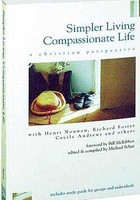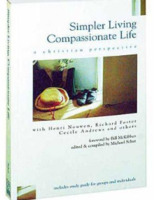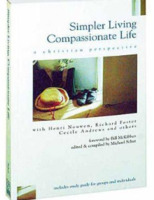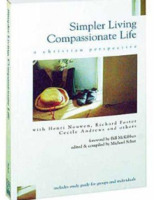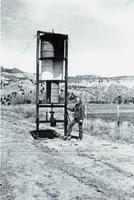Search
8 items
-
“Worldviews” in Simpler Living, Compassionate Life
Simpler Living, Compassionate Life, is a book from Earth Ministries that consists of both essays and community guides regarding humanity’s relationship to our earthly home. This section, "Worldviews," takes a close looks at what has led humans to treat the earth so poorly. It highlights various ways of viewing and comprehending the world around us, especially in the West. It offers that ideas such as dualism have been toxic to our understanding of the world and our relationship to it. -
"Theology in Support of Simplicity and Eco-Justice" in Simpler Living, Compassionate Life
Simpler Living, Compassionate Life, is a book from Earth Ministries that consists of both essays and community guides regarding humanity’s relationship to our earthly home. This section, "Theology in Support of Simplicity and Eco-Justice," captures the Biblical and faith inspired foundation of the movement toward simplicity. It encourages those who are participants in a culture of over-consumption to reconsider their lifestyles and reverse the damage done to the gift that we have received. -
“Simplicity is Nothing New” in Simpler Living, Compassionate Life
Simpler Living, Compassionate Life, is a book from Earth Ministries that consists of both essays and community guides regarding humanity’s relationship to our earthly home. This section, "Simplicity is Nothing New," looks back to ways that the Holy Spirit has inspired simplicity in the lives of Christians through the ages. It provides a framework for the 21st century pursuit of simplicity in American and Christian history. -
"Social Structures and the Politics of Simplicity" in Simpler Living, Compassionate Life
Simpler Living, Compassionate Life, is a book from Earth Ministries that consists of both essays and community guides regarding humanity’s relationship to our earthly home. This section, "Social Structures and the Politics of Simplicity," looks at systems in society that perpetuate and encourage over-consumption. From theology to capitalism to advertising, authors call out ways in which we have built our world for destruction. It focuses not only on personal choices, but the necessity of engaged politics and policy. For the full version Moriah Reichert's review of this section of the book, visit the link below. -
Wind Energy for Earthkeepers
Technology for the Poor, a non-profit charitable organization based in Westerville, Ohio, discuss their design for low cost wind energy in this excerpt from their manual:
"In recent decades due to the search for renewable energy, many efficient wind generators have been developed and tested. Today, we see enormous wind generators dotting the landscapes of many states. Wind generators, especially the recent ones, are quite sophisticated, costly and needs expertise to maintain and operate. The most appropriate wind machine for use in less income countries was found to be a simple machine invented by a Finnish Engineer, Savonius." -
How Can Church Members Increase Their Environmental Awareness?
Many churches and groups have started excellent initiatives to promote sustainability within their congregations. However, it does not need to stop there. Taking a look at your individual lifestyle can help further the impact you have on the environment. The BYU Religious Studies Center has an excerpt written by Danielle Montague-Judd, "How Can Church Members Increase Their Environmental Awareness?" that gives advice and tips to promote sustainability. -
Christians and Endangered Species
Throughout time, it has often been difficult to reconcile concepts from both biology and theology. This article focuses on the critical impact of endangered species with regard to various Christian religions. Citing biblical text, especially the story of Noah’s Ark, many religions have deemed the preserving and caring for all living creatures to be of utmost importance. -
The Clan of One-Breasted Women
In this excerpt, Terry Tempest Williams reflects on her family's long-running history of developing cancer that traces from nuclear testing in Nevada. Williams emphasizes her experience of coming to terms with deviating from Mormon norms if it means advocating for the U.S. government to take responsibility for liabilities regarding human health. Williams decides blind obediance will not get her anywhere, and she needs to start asking questions.

